#i think stories have value & tradition has value & religion in its way has value. but youre not supposed to actually fucking believe it 😭😭
Explore tagged Tumblr posts
Text
actually my least nuanced opinion is the ~supernatural~ isnt real and also is dumb.
#im so niceys about like every opinion i have... not this one im very rude about this one#i think stories have value & tradition has value & religion in its way has value. but youre not supposed to actually fucking believe it 😭😭
11 notes
·
View notes
Text
Creating Fictional Holidays
Happy Holidays everyone!
Like mythology or folklore, holidays can add an extra bit of realism and magic to your fictional worlds, and provide for an interesting setting to portray characters, culture, or even family dynamic.
While you can use real world holidays and adapt them to your worlds, you may also want to create your own! Here’s a few things to consider:
1. What does your holiday celebrate?
Typically, holidays come from historical events or events believed to have happened by religious groups. Christmas is the celebration of the birth of Christ. Diwali celebrates the victory of light over darkness, or good’s triumph over evil. Passover celebrates Israelites’ escape from slavery. This would be a great chance to delve into the history of your world, and how it forms and influences communities.
Otherwise (and as well as), holidays can be expressions of important cultural values such as community, hard work, or family. The Day of the Dead (or Dia de los Muertos) is the celebration of honoring passed family members, Labour day is held to honour the struggle for unionization by working people. What does your holiday say about the society or community that created it?
2. How has your holiday adapted?
As much as holiday is entrenched in longstanding tradition, there is no escaping modernization and adaption to contemporary norms. As much as Christmas is a religious holiday at its roots, for many, it’s a celebration of family and gift giving. Rather than being a saint, Santa has become the jolly toy-maker separated from religion entirely.
If your holiday began to celebrate say Harvest season, but in modern times ‘harvest season’ is no longer regularly recognized, how does this society continue to celebrate this holiday? Where does tradition and modern standards intersect?
3. How do people perceive the holiday?
Even joyous, wholesome holidays are going to have haters. Just think of Valentines Day coming around every year—there are people who love it, people who hate it, and people who see it as a superficial excuse to fund capitalism and consumer culture. What do the people of your world believe about the holiday, or what groups/communities are invited or left out?
4. What rituals go into celebrating your holiday?
During Christmas, many families bring in a tree, wrap gifts to put under it, and bake cookies for a secret intruder in the night. A ritual is just a way people honour something—it doesn’t necessarily have to be cultish or ‘evil’. What longstanding rituals go into the celebration of your holiday?
Maybe gifts are exchanged, candles are lit, cards are given out, money is donated, certain foods are given up or certain times limit eating (such as fasting), families gather, parties are held, etc. etc. There are thousands of ways people celebrate what’s important to them. Consider how each family or character in your story might take a slightly different spin on the same rituals.
I hope no matter what or how you celebrate this year, you get time to spend with your loved ones <3
#writing#creative writing#writers#screenwriting#writing community#writing inspiration#books#filmmaking#film#writing advice#holidays#festiveseason#worldbuilding
289 notes
·
View notes
Note
It's hard talking about the disrespect to Greek mythology and religion when every argument people brings to the table is "look at this original novel that is adapted into a movie that is turned into a tv show that didn't follow the original plot" as if the Greek culture is on par with fictional story instead of a tradition and heritage of real life people.
A media that is broadcast to the public and make accessible to everyone that erased the values and lesson of a cultural story still can do harm when it feeds misunderstanding and misinterpretion of the culture it originated from.
Greek people has the right to be upset when their culture keeps getting misrepresented, doesn't matter the good intentions behind it, why must it be at the expense of Greek culture?
You can create arts that is so beautiful and so praises by many, and years from now you could look back and see what an amazing experience and community you have created out of it. But at the same time you also continue feeding the distorted ideas and flawed understanding about a culture as a whole.
All because you took from a culture and want to tell your own story.
Retelling is telling back the story. Any addition or new ideas you bring is when there's part in the original story that is vague or open for interpretations. Even then, when you elaborate, you follows the already presented ideas that the original story already established.
If it so beloved to you and so meaningful to you, why couldn't you be faithful when adapting and retelling with the talents you have?
Shouldn't it be better if you created an original story inspired by it? If you feels that the values and standards are not to your taste, but you so loved the stories and could related to it, isn't it better to create original characters and settings with your own voice and narrative with the story inspiration as the backdrop?
At this point, what is greek mythology and lore to you? That makes you so passionate so inspired, that spark your imagination that encourage you to be creative but it is at the ruin of old age history that is meaningful for the Greek identity. Do you really appreciate the values and moral that you gained from the stories, or did you forget yourself along the way?
I couldn't have said it better! I agree to all that because that is exactly my sentiment as well! On one hand of course I am proud that Greek mythology contnues to inspire and people want to create stuff on them or that even now there are people who think the values of Greek Mythology are universal and they are!
But as you said it pains me to no limits when stories that were literally created from people based on their culture and religion to pass on messages are not only distorted beyond recognition but also to a degree where nowadays most people of Greek mythology liking spectrum know only how terrible villains some men are (in actual mythology they are complicated personas) and how weak women are (there are literlly figures in Greek mythology that are so strong personas that honestly I am shocked. See Helen for example how she is the most projected persona as a pretty face that does nothing when Helen literally taks back to Aphrodite, she is the only one who sees through Odysseus's disguise, she has knowledge of medicine and so much more for once) Mythology loses all its meaning, all its allegory and all its cultural spectrum because as you said people do not use it to retell the story, they use the word "retelling" as their excuse to just tell a story that fits them by using the popularity of greek mythology and yes as you said why cannot they say their original stories while using inspiration from Greek mythology?
Honestly I have nothing to add! You said it all dear Anon!
#katerinaaqu answers#greek mythology#tagamemnon#retellings#“retelling” means “tell the story again” it doesn't mean “make it unrecognizable”!#people still can critisize regardless of pure intentions#ancient greek myth#ancient greek myths#ancient greek culture#food for thought
38 notes
·
View notes
Note
A while back you reblogged my post (pisses me off when sci-fi writes religion out of their stories) and I've been turning what you said over in my head since then. Specifically in the past few days, as the version with your addition has been passed around.
What, specifically, DO these authors think they’re writing out of their story?
Ive been trying to find a charitable way to answer this question for myself, but it's hard to. I'm jewish, after all. To me, a story without religion is one where my people have been wiped out. That was the original point of my post, but... i think that what you said, about religion being tied to culture and tradition and the context of its time, makes the image in my head a little sadder.
It becomes one where jews haven't just been wiped out, but completely forgotten. Rendered obsolete.
I don't know what point I'm trying to make, really. I just wanted to share, and to thank you for the interaction. I've gone through your blog a bit, and you seem pretty cool. :)
Hey, I'm answering after a long delay, because what you asked was something I needed to mull over.
I think a fair few things are happening. And I thought this over long enough that it even came out in a semi-coherent list.
First, I think people forget that secularism is an ideology, not a "default" neutral state of how human societies organise themselves. Because there's no such thing as a "default" human society. It's a specific idea that a lot of people decided to believe in.
Second, I think they forget that secularism is a culturally-bound idea that emerged out of the religious history of Western Christendom (i.e., Reformation and Counter-Reformation punching each other in the face). The idea that the political and the religious could or should be separate spheres, with religion being private rather than public, did not show up anywhere else in a way we'd recognise unless Europeans barged in.
Third, people think secular = modern. People already will comfortably imagine that someone living in the modern age could be doing so without being modern: "modern" means looking, thinking, and behaving a very specific way. The old (broke-ass) narratives that projected that humanity would one day abandon all belief in religion, spirituality, the supernatural, superstition, or even plain-old clinging to ideologies in favour of ascending to pure enlightened reason have demonstrably turned out to be bullshit. But if you're raised with a cultural belief that progress to modernity looks like progress to secularity, then it's an article of faith that the scifi future will be secular.
Fourth, I think there's some wicked bad history involved in what people are writing out when they write out religion:
They tend to assume that no one was oppressed, enslaved, marginalised, or stressed before Big Monotheism.
They tend to have the very specifically Protestant definition of "religion" as individually-held cosmic convictions—and to project both that definition of religion and the cultural primacy of the individual into the past and the future as universal values so that, the less a religion reflects the core positions of Protestantism, the less it will be understood or presented favourably (unless its a Noble Savage'd indigenous tradition).
They tend to associate religion with "violence" and "intolerance," even though (to quote the sociologist José Casanova), "none of the horrible massacres [of the 20th century]—not the senseless slaughter of millions of young Europeans in the trenches of World War I; or the countless millions of victims of Bolshevik and Communist terror through revolution, civil war, collectivization campaigns, the great famine in Ukraine, the repeated cycles of Stalinist terror, and the gulag; or the most unfathomable of all, the Nazi Holocaust and the global conflagration of World War II, culminating in the nuclear bombing of Hiroshima and Nagasaki—can be said to have been caused by religious fanaticism and intolerance. All of them were, rather, products of modern secular ideologies."
So that's what I think is going on :/
13 notes
·
View notes
Note
Hey! I'm really sorry that life has been so rough lately, I'm keeping you in my thoughts 🙏 here are some things I'd love to hear your thoughts about, & feel free to make it as long & detailed as you want! 1/your favourite piece of Bajoran worldbuilding (from the show or from a fic you've read or from your own headcanons - you decide!); 2/your favourite type of alien clothing on any star trek (or single favourite alien outfit) & why you like it; 3/what your concept for Ben & Kasidy's child is: who they are, who they grow up to be, etc.; & finally, 4/your opinions about the clock Ben builds in "Dramatis personae". Here you go! Take care <3
... this is so incredibly sweet, thank you😭😭 I really truly appreciate it, as well as all of these Very interesting questions❤️❤️
Ahhh it's hard to pick, I love so much about Bajoran worldbuilding! First of all the non-linearity of their religion is SO COOL & mind-blowing to think about, & I really love the way it- by its very nature- allows you to re-contextualise so much of the show's lore. Like- is Joseph Sisko written into ancient Bajoran prophecies thanks to his non-linear affair with a Prophet?? Do those prophecies inform or influence traditional archetypes of love in Bajoran culture?? Did Kira grow up learning about an archetype of corporeal love based entirely on Joseph Sisko, the father of an alien man who would decades later become her boss??? I don't know!! But I can write fic about it!!! (And then not post it!!!🙈😂) I do headcanon that dominant Bajoran cultures all have strong archetypical figures, it just makes sense to me given their caste system & that "three brothers" story Kira tells Ben & just how much emphasis they as people place on roles and duty and their place in the world (and on their world). I also love the recurring theme that they greatly value (and like, listen to) their planet. They talk about Bajor like it's a living organism, one big ecosystem they are all a part of, and whenever there are floods, famines, earthquakes, etc, they pay attention, as if its a bug in the immune system- such an interesting contrast to Cardassia, where they plundered their own resources & then came for others. There's this whole collective spiritual (rather than strictly political or social) connectivity that I find very fascinating- something about Kira thinking of herself as simply an empty "vessel" to the powers that safeguard her planet & connect her to her fellow Bajorans. It makes me wonder about their large diaspora, & the sort of pain Bajorans like Ro may carry around over that forced separation. Oh, and that they have Fire Caves. Like those Fire Caves were really just hanging around the whole time huh. Also that Proper hasperat is apparently supposed to be made with a brine so strong your eyes water. So that's five things!
2. Garak's Watermelon Suit.
3.
Lol jk. Garak does have some fire 'fits tho (that red and black tunic with the embroidery? A Look🙌) Anyway,
2. I also think Lenara's purple formal dress was really pretty! And most of Quark's outfits are killer tbh. The detail!
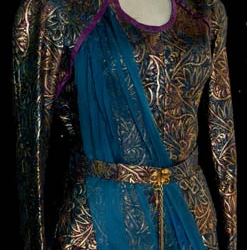
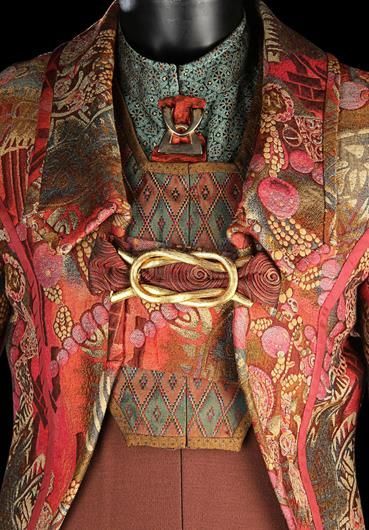
Kira's dress from 'Fascination' was fun- and I like both Winn Adami costumes a lot, the vedek robes with the opera house hat & also the golden kai robes. Again, there's a lot of cool details (esp with that elliptical Bajoran symbol & patterned fabric which the 90s quality completely nukes.) Oh, and speaking of hats- all of Guinan's hats are iconic, and Jadzia's Klingon wedding dress was pretty cool too. Basically I am terrible at choosing things; I just now remembered Spock's Goth Chic robe from TMP and that reminded me SNW has been doing some really cool things with T'Pring's wardrobe-
3. The siskasidy baby!!! I have named this baby so many different things in post-canon fics lol, everything from Jennifer to Sarah to Jadzia ("Jazzy", or "Jazz" for short- I think this is my favourite, given how Avery Brooks seems to be irl about jazz.) I don't think I have any real headcanons about who they grow up to be (I'd love to hear any ideas you may have!) but I did come to terms with Ben missing out on their first year(s?) by imagining he sort of spiritually shares consciousness with several Bajorans over that time period (very much consensually, like this is an experience that allows these Bajorans to walk with the Prophets for a time & also enriches Ben's- and the Prophets'- understanding of Bajoran life) and these Bajorans befriend Kasidy & look out for her and the baby <3
4. Lmaooo I have SO many feelings about this clock. Like WHY did he build a CLOCK. *frantic strings across conspiracy board* I know, I know, the writers were probably just going for something random at the time, it was, at heart, a goofysilly s1 episode that easily could've been on TNG or VOY- but it really does become sort of mind-blowing when you consider it in the grander scheme of Ben's arc. Plus- they kept it in his office throughout the series!! They put it in JAKE'S HOME in the alternate 'Visitor' timeline!! I do think that episode implies their weird behaviours also came from somewhere within them (that's how I like to explain Kira Your-taste-in-men-frightens-me Nerys flirting with Weird Aliens Odo & Dax anyway😂), so I like to think Ben just has this deep ponderance of time & temporality just like. Sitting within him somewhere. The clock was actually from an ancient Gamma Quadrant civilisation whose memories possessed them all, but I still feel like that last shot where Ben sets off the timepiece he (for some reason) built from scratch and lets it tick was Symbolic somehow. Like- this man is part-Prophet!! He was conceived non-linearly his birth was arranged he was always meant to discover the Celestial Temple aka the path to- you guessed it- the Gamma Quadrant!! Something something Events Set In Motion
#thanks again for the ask! I typed this all out last night but it was horrible & full of typos so I held onto it before posting#but it was an excellent distraction thank you :)#ask game#<- again not really that's just my tag for asks
10 notes
·
View notes
Text
Three Questions
Originally posted February 18th, 2016
Or, my general approach to criticism is to ask:
What is the story/film/video/song/album trying to do?
Does it accomplish its goal?
Is that a goal worth pursuing?
The first question is an important one, and answering it can either be incredibly easy or ridiculously difficult. Dragonball Z: Abridged’s goal is simple: to retell the original series’ story as a clever action comedy. Some complex works have simple answers to this question too; Kendrick Lamar’s To Pimp A Butterfly’s goal is to interrogate the commercialization of black culture, and Plato’s Republic is trying to establish a working metaphor/definition for/of justice.
A work like Andrei Tarkovsky’s Nostalghia, on the other hand, can be much more difficult to parse, as the film raises questions about the nature of romantic love versus sexual desire, the the inability of many artists to connect with those around them, and the value of religion and tradition in a modernist world. In this scenario, the critic’s values have to come into play, and so, in my opinion, the important questions raised by Nostalghia are united by the disconnect modernism forces upon people, with the main character’s “objectivity” resulting in his disconnection from the world, and his return to religion at the end symbolizes his embrace of traditionalism and the restoration of his ability to connect with others. I’m personally in favor of this perspective, and I believe the text supports it, but hey, I’m really interested in critiquing modernism and the negative effects it has on society, so I could well be missing another argument that ties the themes of the film together more closely.
The second question tends to always take work to answer, but that work is, in a way, the simplest. The task here is to articulate the weaknesses and failures of a story, which are things most people have an intuitive sense of when they consume a piece of media. To do this effectively, you need training, both in the terminology of story, character analysis, and the vocabulary of your medium, and in effectively articulating your thoughts. The great thing is that almost all of this training is available online: almost all current criticism is published online for free, Wikipedia is a treasure trove of information about film theory (start with Eisenstein and go from there), (I’m sure musical and writing theory is there too) and there are hundreds of people online providing the best and most effective information on film I’ve received (I’m gonna link to a few).
Now, the downside to this is that as you grow as a critic, you may have to move past the critics you started watching/reading in favor of more intelligent and nuanced critics (I’m not going to point fingers here, but there are some critics I used to love that I don’t find particularly interesting or insightful anymore). And there’s also a whole lot of super pretentious criticism out there that isn’t particularly clever or interesting that you have to wade through to get to the particularly good stuff. This tangent has gotten quite long now, but my point is essentially that to be a good critic requires reading a lot of good criticism and learning a lot about the medium.
The final question I ask is the most subjective, but it’s also, in my opinion, the most important. And, the thing is, it’s a question that, whether people realize it or not, everyone automatically asks themselves when watching something. Whether or not I believe the writers should be attempting what they’re attempting will unquestionably influence my opinion on the story itself, and as such, it is my first and last job to question myself in addition to their goal.
Now, here’s the thing: it’s both always that dramatic, and almost never that dramatic. When I’m watching Dragonball Z: Abridged, I already believe there’s inherit value in adapting melodrama to comedy, and I honestly think it suits the emotional beats of the story better than the original. But since I find it incredibly valuable just beyond that, I have to ask myself why, on a deeper level, I find it as important as I do, and my next answer is that it’s valuable because it interrogates the original story by including queer characters, making the women actual people, and showing us, in an even clearer light, just how poor of a father Goku really is. Similarly, when I’m saying that the invalidation of Dodoria’s identity by Vegeta is harmful (as in my review of Episode 15), I’m not just saying that his comments are harmful because they’re transphobic, I’m saying they’re harmful because the lack of a counter to his comments frames the degradation of transgender people in the show as entirely normal, and the default response to the existence of women like me.
That last point is the most nuanced one I want to make, as it captures the “ethics” behind my criticism. I’m not interested in bashing artists for creating work I disagree with, I’m interested in questioning the ideas they present and fostering understanding as to why I don’t support those ideas. Saying that as a woman who reviews an internet parody of a 90s anime is, interesting. Yet it is the only way I can describe just what I’m trying to do with this blog and my reviews (well, in addition to fostering critical conversation about “illegitimate” forms of media, because I believe that nothing is above critical analysis). And I hope that in general, that’s what I’m accomplishing.
#film criticism#film theory#nostalghia#andre takovsky#dragon ball z abridged#team four star#so there is a term for this method#it's 'goethe's questions'#and i think i must have encountered it#internalized it#and then forgotten where i heard it from#which is just an ADHD mood if i ever heard of one#Goethe's questions are a useful metric in a lot of ways#but i find i get more analytical mileage out of interrogating the meaning#rather than the craft#and am way more interested in asking#why did or didn't this film resonate with me?#than 'was it a well crafted film?;
2 notes
·
View notes
Text
i’ve been thinking a lot about how we tend to separate the sacred from the everyday, and how that split between “spirit” and “matter” can get us into trouble. marion woodman talked about it in one of her lectures—this idea that western culture especially has elevated spirit as something pure and holy, while treating the body (and everything “earthy”) like a second-class citizen. we see it in the myth of eve and the serpent, where matter—literally “mother”—got shoved into the realm of sin and darkness, and spirit got to float off into the realm of light.
thing is, this attitude isn’t just about a bible story. it’s also about how we view ourselves. whenever we shove down our anger or jealousy or lust or grief, telling ourselves we should “rise above” all that, we’re basically saying our human messiness isn’t acceptable. and that, i think, is where addiction often steps in. if you’re stuck in a world that doesn’t want you to feel what you feel, it’s easy to see why so many people look for ways to escape—from booze, from food, from shopping, from endless doom-scrolling.
one of the coolest parts of woodman’s talk is her emphasis on honoring the feminine as embodied in this figure she calls the “black madonna.” it’s a symbol of the divine that’s fully down here with us on earth, not hanging out on some cloud. the black madonna is strong, messy, rooted in the body and the soil, and she’s not afraid of darkness—she sees it as the place where new things are born. that’s such a radical shift from traditions that say you have to follow strict rules and keep your “bad” impulses in a box if you want to stay spiritually clean.
that brings me to organized religion and why i think it’s so often part of the problem. don’t get me wrong—there’s value in having a community and a shared set of values, especially if it gives you comfort and a sense of purpose. but in many cases, these institutions have historically doubled down on the spirit vs. matter split. they push heaven or some transcendent realm as the “real” goal while treating the earth, the body, and especially women’s bodies as corrupt or lesser. and that has huge consequences, because if you think your body (and by extension the entire physical world) is just a testing ground for your soul, you might not care about it as much. you might ignore its signals, blame it for your problems, or see it as a temptation that has to be beaten into submission.
all of this can lead to a lot of shame, fear, and guilt—sometimes to the point where people give up on themselves or adopt a hyper-judgmental attitude toward everyone else. nobody wins in that scenario. personally, i think the best way forward is to reclaim our wholeness. we can still be spiritual beings, but let’s do it in a way that doesn’t make us hate our humanness. there’s something magical about realizing that the “divine” might be right here in the sweat and tears and mud of our everyday lives, not off in some perfect sphere.
when we start to pay attention to our own bodies—listening to that inner voice that says, “hey, i’m hurting, can we slow down?” or “i’m craving sweetness, but maybe it’s not actually chocolate i want, it’s emotional warmth”—we build a bridge between spirit and matter. we learn to hold tension between higher ideals and lower impulses, and in that tension, something new arises, something that actually respects both parts of who we are. that’s what woodman calls the emergence of a “third thing” or a new consciousness. it’s that moment when you’re no longer killing off half of yourself just to stay “good.”
honestly, i believe if people stopped treating this planet (and our own physical forms) like some moral prison we’re trying to escape from, we might actually solve a lot of global problems. we’d probably treat each other with more compassion, too, because once you accept you’ve got your own messy darkness, it’s harder to judge someone else’s.
anyway, that’s what’s been on my mind lately: that maybe if we can end the war between spirit and matter—if we can embrace our bodies, our emotional depths, and the earth as sacred—we might finally find a little more peace within ourselves and with each other. it’s not an easy road, especially when so many people keep telling us we have to choose between our souls and our bodies. but i think it’s worth trying to prove them wrong.
1 note
·
View note
Text
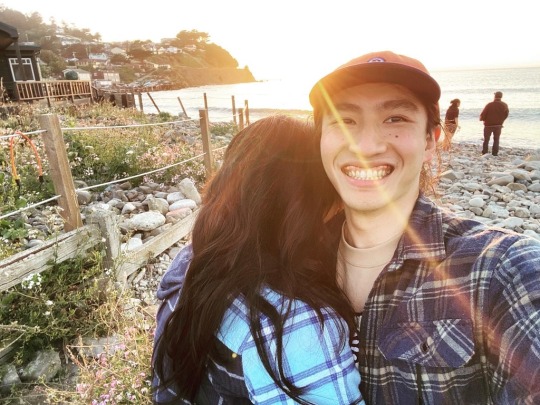





I love when pictures actually represent the actual emotions that occurred in the moment and day.
We cheese so hard that our gums and silliness are showing. We also hit golden hour and it was beautiful to see it at Pacifica!
This relationship has and continues to teach me a lot about my partner, myself, relationship dynamics, and values. I would not have picked a better person to learn with! So here are 5 (there's a theme here) things I have learned.
Peter has really accelerated the truth seeking side of me. He asks a lot of questions that sometimes I am not ready to face and answer. Whether it is religion, culture, and traditions, he pushes me to discover more about the values I was raised with and whether they still serve a purpose in my life. I definitely had a hard time in the beginning because it shook my core, but it definitely has helped me with my transformational phase in life!
A supportive community helps the relationship. I am really thankful to have my friends and family who are supportive of my relationship. My friends are supporters through the highs and lows. Despite the lows in relationships, my friends are willing to sit with me and practice mindfulness and compassion. Not only are they hearing my perspective, we always make sure we make space for Peter's perspective too. I am not a huge fan of one sided stories so I do what I can to provide Peter's side to pain the full picture. The goal is to grow and learn. The goal is to gain better tools and insights to make Peter and I, a stronger team.
Our relationship dynamic has its own uniqueness! From the way we reassure each other to how we grow together. Peter and I have seen each others patterns (the great and not so great). I can't speak for Peter, but I have showed him my lowest and it definitely impacted our relationship. It made me realize the importance of boundaries and what really mattered to me in relationships and in my life. These lows pushed me to prioritize taking care myself and also protecting the relationship. Peter is really great at supporting me and I hope continue to be the best supporter for him in the way he needs and wants to be supported.
Our differences actually keeps us together. I am taking back the word "different" and embracing it to the fullest. When Peter and I made our relationship public, it definitely impacted us. Our mutual friends' first reaction was " Oh they are different", and expressed a lot of skepticism. It's not that Peter and I are the opposites (referencing opposites attract), but differences actually brings more to the table/relationship. Learning and maintaining interests in a partner and seeing them as who they are brings curiosity. It brings a lot of teamwork and effort in the relationship which leads to commitment in each other and to ourselves as individuals. This is a way for us to grow in ways we may have not expected to grow if we were not together.
Awkwardly enough, I actually think Peter and I have a lot in common. Peter is actually the first person I was 100% myself with and that was truly difficult for me to do at the age of 20/21. Despite him not being a huge fan of himself around that time (sad boi phase), I really appreciated him as a person. Even though there were patterns he and our mutual friends have noticed in him, I still appreciated all that he was at that time. He was perfectly imperfect <3. I think it's because he was just himself despite others opinions. He was strong in that way and it inspired me to let my walls down and just be myself. It felt safe to be myself. How and who he was was how I felt connected with him. We can understand each other's feelings, but the way we react to our feelings can be different. Even in the present, Peter shows me what he desires and his motives in life. Although I may not always align with the way he approaches his motives, the feelings he desires is when I feel connected to him the most.
P.S. I also just miss him right now so I wanted to use this moment to write about him and my relationship heh.
0 notes
Text
"The Dubbing." From Surah Seven, Al Araf, "The Heights."

Recall the Quran is a compendium of religious teachings that were being juggled at the time Muhammad and the rest of his relatives, business partners, and neighbors were plunged into a war that spanned the Saudi Arabian Peninsula.
Muhammad, who was a lawyer, made some unpopular decisions during a dispute and this started a war. He ran for his life into the desert and during his refuge there, God gave him the Quran.
Every book and chapter in the Quran is a written analysis of religious philosophic thinking that was otherwise a part of an oral tradition. This is why there are long-winded discussions of Jesus, Moses, Elijah, Solomon and other Biblical figures in the text, rather than accurate scriptural references. The Arabs discussing the material had no such things. If they did have them most could not read them anyway.
The contents of the Quran are the product of theological discussions performed by Arabs who were religious, but wrote their inspired throughts down in Arabic and called the album the Quran.
Araf, the Book we are discussing here is called the Heights because explains three states of existence, the lower, the earthly and the Heights, the heavenly abode of God and the righteous. Unlike prior books the Heights focuses on topics about which a prophet would warn others vs. the proper approach to pilgrimage, how to observe the Pillars or accomplish the mundain tasks of ordinary daily life.
No matter the level of societal practice, the Quran is ever a vehement opponent to corruption, violence, waste, abuse, poverty and war where they seem to brew up. In this section it quotes the story of Noah and the Great Flood, contrasting the ways the wind and the rain bring life, and how they can be used to destroy humanity if it chooses to abuse the privilege:
7: 57-63:
He is the One Who sends the winds ushering in His mercy. When they bear heavy clouds, We drive them to a lifeless land and then cause rain to fall, producing every type of fruit. Similarly, We will bring the dead to life, so perhaps you will be mindful.
The fertile land produces abundantly by the Will of its Lord, whereas the infertile land hardly produces anything. This is how We vary ˹Our˺ lessons to those who are thankful.
Indeed, We sent Noah to his people. He said, “O my people! Worship Allah—you have no other god except Him. I truly fear for you the torment of a tremendous Day.”
But the chiefs of his people said, “We surely see that you are clearly misguided.”
He replied, “O my people! I am not misguided! But I am a messenger from the Lord of all worlds, conveying to you my Lord’s messages and giving you ˹sincere˺ advice. And I know from Allah what you do not know.
Do you find it astonishing that a reminder should come to you from your Lord through one of your own, warning you, so you may beware and perhaps be shown mercy?”
Commentary:
No one knows why mankind will not forsake its manufacturing of weapons or resorting to violence as a means of accomplishing its objectives. Every religion teaches these things are grievous and must not be done. Even Muhammad said, "It is astonishing that a reminder should come to you, who want to be shown God's mercy."
Since civilization began, God has been pressuring us to stop being warlike and settle down but even still that has not happened.
As the former frame said there are Six Days, six grades man must graduate from if he expects to learn how to abandon his violent transgressive nature and achieve Muslim Nirvana, freedom from doubt and ignorance. They are:
v. 57: He is the One Who sends the winds ushering in His mercy. First was God. The Value in Gematria is 15196, י״האטו, hato, "the motorcar."
v. 58: The fertile land produces abundantly by the Will of its Lord, whereas the infertile land hardly produces anything. This is how We vary ˹Our˺ lessons to those who are thankful. Muhammad was always clear he was discussing the nature of a God that cross-pollinated mankind across the times and distances in order to create the best, most contemporaneous understanding of religion possible. We should be grateful we have the chance to learn all of it and as a result be the most worldly spiritual personalities we can become. This is why the Quran is called the Cream of the Verses as it represents the distillation of every religious thought system the arabs knew about at the time.
The Value in Gematria is 12624, דיבוב , "dubbing."
v. 59: Indeed, We sent Noah to his people. The Value in Gematria is 9356, טגהו, taghu, "proofread."
v. 60: But the chiefs of his people said, “We surely see that you are clearly misguided.” The Value in Gematria is 4635, דוגה, "worry."
v. 61: He replied. The Value in Gematria is 12323, אבגבג , "the Alphabet roared."
v. 62: Do you find it astonishing? The Value in Gematria is 12316, יבגאו "they will be proud."
Within the story of Noah as retold by Muhammad in the Quran does not mean we need to build an Ark or go two by two with the garanimals into a big boat. We do however, need a vehicle, and Muhammad said it is the human brain that is fixated on the mysteries of heaven.
These must be retold, relearned, and retaught periodically so mankind does not continuously falter, these must be done professionally and accurately, to avoid apostasy, the world's hugest problem at the moment. Everyone thinks they understand the Bible, the Torah and the Quran and no one does and this is causing many persons to act strangely.
The Gematria mentions we should worry about this, being connected to strangers that apparently mean to cause us harm for reasons that do not make sense. Muhammad said not to try to fathom the reasons have for wanting to violate the Quran. Every member of mankind must possess a clear mind and worry clouds the mind, so Muhammad said not to worry.
All one can do is become as literate as possible in its tenets and ensure the laws of the land support the vision. This is what will save mankind from all the causes of manmade harm. But if this idea of refraining from violence is to become appealing, it must be viewed as a highly desired aspect of respectable people. This is not the case in many parts of the world because incorrect teachings about religion are being dubbed.
The Holy Season is being dubbed in just such a manner. It is being used as a shield for the master mind apparatus of a sophisticated terrorist effort being led by Republican Party and Church of Jesus Christ of Latter Day Saints from within the United States. Even at this time then the people of Israel must be permitted to end the threat America is projecting into Israel and within the Middle East.
All fighting and military action against them in Gaza must continue until every last Republican sponsored terrorist they have recruited to their side has been neutralized. This is the only way to secure the future and the integrity of all the religions named after Israel. There is no greater way to observe Ramadan than to support Israel in its efforts to free the world from the threat of these vile persons forever. Pray do not submit therefore to propaganda regarding the necessity of a ceasefire in Gaza during Ramadan.
0 notes
Text
World Peace – The Impossible Dream?

I’d like to visit about peace. Certainly peace is not only one of the most glaring and pressing needs the world faces today, but it has been thus for thousands of years. Interestingly, the great prophets, sages, mystics and enlightened beings have been speaking and teaching about the need for peace for millennia and yet we, as a species, seem as far away from the realized ideal as ever. Why?
We look to all manner of externalities to provide peace for us. We hope that politicians can negotiate it for us or that it can be won on battlefields. We look to concepts such as “assured mutual destruction” as a means for achieving peace but in the end, none of these methods are viable or sustainable. They can only offer brief respites from conflict and will ultimately lead to even greater contention.
At the core of our collective failure to achieve lasting peace is the idea of separatism – the inability or unwillingness for us to realize that we are all but one human family – one also with the non-human beings we share our home with.
This world view has been fostered not only by politics and economics but by religion as well. I am often asked the question, “What is the difference in religion and spirituality?” The answer is religion is an institution designed to maintain (and sadly, often distort) the message of its figurehead. For Christians – Jesus Christ, for Buddhists – Siddhartha Guatama, for Muslims – Muhammad, for Hindus – Brahma et al, and so on. The problem is, those entities functioned on a much higher spiritual plane than their followers and it was their followers that were charged with conveying their message to the generations to come. The only means available was via oral and / or written tradition – a very limited mechanism.
For example, I can speak for hours, days or weeks about a rose to someone who has never smelled one but it will never compare to the experience of me handing them a rose and letting them smell it for themselves. Do you see the difference?
The followers of the great teachers not only were faced with interpreting the message of their masters, the religious institutions are charged with carrying on that message for generations. Often, and unfortunately, religions are the enemy of spirituality. Where spirituality seeks the unity of man, religions often seek separation as emphatically as economics or politics.
It is this mindset that has given birth to suicide bombings, terrorism, wars, crusades and so much sorrow in the world. When religions began to focus on difference and separation they forget their core value – love. There is a story of a Jewish rabbi who was asked by a religious skeptic to teach the entire Torah to someone while standing on one leg. He raised one leg and replied, “Easy, do not do unto someone as you would not have done unto you. The rest is simply commentary.”
So what is the true path to lasting peace? It begins with the internal, not the external. If we are to ever transcend the violence and hatred that plagues our world, we must begin to focus on our collective sameness. We must change ourselves and our thinking – inside. We must necessarily realize that we are all one and that which we seek is already within us.
We must, as individuals, begin to understand and appreciate the divergent paths to our higher-selves. Think of it this way – you can place ten different lamps in a cathedral and they will certainly appear physically different. Yet, light each one and extinguish the main light in the room and you will not be able to tell one from the other. The light emanating from each will appear the same. The differences will have vanished leaving only their light.
As long as the forces of religion, politics and economics traffic in the idea that their way is right and all others are wrong, nothing will change and they will remain the enemies of spirituality. We will still feel vindicated and righteous in acts of exclusion, defamation, hatred and even murder. But when we collectively and individually begin to understand what the great spiritual masters were really saying all along, that we are all one and we must treat each other as we wish to be treated, regardless of race, creed, culture, religion, economic status and the like, then and only then will peace prevail.
It begins inside each of us. The will to let go of judgements and begin to accept, that is where the ‘battle for peace’ starts.
~Edward G. Dunn
Check out the Happiness 2.0 Podcast — https://podcast.edwardgdunn.com/
Read the Happiness 2.0 Blog — https://edwardgdunn.com/blog
0 notes
Note
I don’t know if this is valid as it’s not an adventure request, but DMs were closed so it wasn’t possible to check in advance.
What is your position on campaigns/adventures that are very direct parallels to colonialism? Somewhat broad question but I’m curious where you stand on the subject, especially since opposing ‘foreign explorers use violence to extract wealth from less developed peoples’ is about as mainstream as D&D gets.
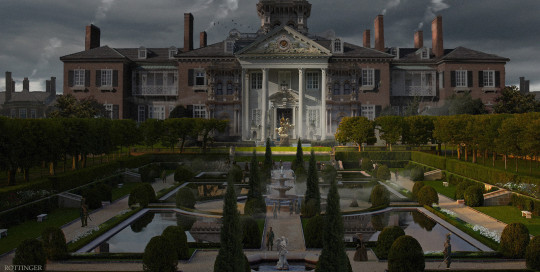
ALT
ALT
Heavy Topics: Colonialism
I find this question so interesting because for a long long time d&d was a game that was (at least tangentially) very pro-colonialism what with the scientific racism built into the lore about how the lesser monstrous races should be culled, curtailed, or corrected. People thinking that Anticolonialism is a hallmark of the game means that somewhere along the way there’s been some kind of seachange, either in the playerbase or the greater culture and it’s happened over the course of my fairly short d&d playing lifespan.
I’m going to go into lots of detail on this below the cut, but TLDR: While D&D has never specifically endorsed colonialism, the game used to have driving factors that were direct holdovers from the imperialist tradition: a dynamic of inherent superiority for those peoples deemed “good” Just like in our own history, these drives were seen as heroic but seem to have rapidly fallen out of fashion leaving an uncomfortable gap at the heart of the hobby.
As for adventures that involve colonialism, they’re fine, just do your research and make sure you’re not glorifying or tacitly endorsing genocide. A lot of great stories can be told against the backdrop of mass exploitation, just be extra cautious if you’re going to try and directly reference/evoke something that happened in our own world.
First, Lets talk about supremacy: In the earliest days of d&d, the world was divided into two sides, law and chaos, with law taking on everything that could be considered good and nurturing, and chaos taking on all that was wicked and destructive. It was this meme, but literal:
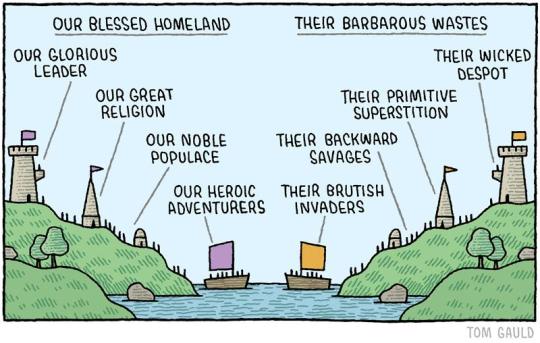
ALT
I don’t think I need to tell anyone this, but that sort of ideology is the worldview of an oppressor, one who thinks their own nation/religion/ethnicity is right and chosen and all others are inferior. It’s also the same sort of cartoonish black/white morality you see in today’s fundamentalists: my enemies can’t just be wrong, they have to be doing the most evil things I can imagine ranging from being authoritarians to practicing human sacrifice and being in league with the literal devil. That’s why the argument “(depiction of monster fantasy race X) isn’t racist, (X) are literally embodied evil and thus its ok to kill them” should never hold any water because it’s the exact same narrative that’s been trotted out over and over to justify IRL genocides on various scales.
The old monster manuals used to go out of their way to talk about how various species of monstrous humanoids ( which is totally not a synonym for “lesser races btw) spoil their environment just from living within it, that they make nothing of real value, no art no tools, and what weapons they have are either crude constructs or stolen from their betters. The obvious connection here is that the players should feel no qualms about walking into their lands and putting them to the sword so that “real” people can make use of those lands, or at least to stop their encroachment on the party’s own territory. And here we get to the root of the issue: in trying to create a world in which it is ALWAYS right for our heroes to slaughter their way through hundreds of enemies, the evolving mythology of d&d over nearly 50 years adopted the exact same talking points used by the villains of our world whenever they felt like they had slaughter their way through hundreds of other human beings to get what they wanted. As one of those people who others would slaughter in the pursuit of a “pure” world, I have a big problem with that.
Surprisingly, grey morality leads to way less implicit hate crimes: If two cultures are going to war it’s not because one side is evil and the other is good, It’s because that’s what people in a resource-scarce environments have always done, especially when they were desperate or their leaders saw a chance to acquire more power. I can look at the reign of one history’s greatest warlords: Genghis Khan and say “I think him executing whole cities and making pyramids out of their skulls was an atrocity” without thinking the people of the Mongolian steppe have and always will be servants of the dark lord Baphomet, demon prince of slaughter. If we abandon the justifications built into the game to make killing always a good thing, what we end up with is a diverse gaggle of fantasy species that can be played off against one another when building a setting. Sure, some of these groups may HATE eachother and even commit unforgivable acts against one another, but by removing the lore based condemnations of one group we end up creating a world where that hate and those unforgivable acts aren’t implicitly justified.
Art
#dnd#dungeons and dragons#adventure#5e homebrew#homebrew adventure#heavy topics#racism#colonization#writing#writing advice#DM advice#dm tips#dm tip
259 notes
·
View notes
Text
my predictions for future storytelling realms along the lines of the neverafter and the endless nights im 100% sure about:
realm based on the works of shakespeare (though i don’t think they’ll interact much with this one for purposes of anachronism)
a world based on irish/celtic folklore. smart moneys on this one showing up. with the fairy heavy plot and the fact that brennan is famously extremely irish, it’s coming. (i suspect all fairies originate from this realm in one way or another)
something to do with the epic of gilgamesh, the worlds oldest written story, and other surviving mesopotamian works. i see this world missing huge chunks and having very few versions left, but has survived by the skin of its teeth because against all odds people still remember it. alternatively, it was dead and gone after it was lost, and either archaeologists finding the story created a new version, or it was gone forever
realms i think are possibilities if the story goes the way it seems to be going so far:
ancient greek / roman mythology
i believe by introducing greek and roman mythology as a realm (foreshadowed imo by the appearance of aesop), these realms will be framed for us the audience as collections of human experience and belief systems, not just fictional stories, which will lead to:
jesus being name dropped yet again
allusions to realms based on various other cultures. specifically stories, not religions, the way that aesops fables teach morals and 1001 arabian nights is reflective of cultural values, but neither tell the stories of religious texts. (i don’t think the story will be extremely involved with these realms for both thematic and cultural sensitivity reasons, also simply bc there’s only so many episodes. it would be cool to see a guest dm run a world based off of non european folklore, rick riordan style). this includes but is not limited to:
different realms representing the traditional stories of ancient china, japan, india, and the pacific islands (all so old and so storied there’s truly endless possibilities for worlds based on them)
different realms representing the traditional stories of the americas (northern, middle, and southern traditions differ greatly from each other, as do all the different groups within the regions)
different realms representing the traditional stories of africa (the birthplace of humanity!! the first stories told around the hearth!!! plus, same as the americas: plenty of places to draw from)
brennan is smarter than me and would communicate this better then im about to, but the oral history tradition of many of these cultures has such huge potential in this story. i really hope to see differences in the storytelling of written histories/oral histories (for instance: hawai’ian hula tells the historical record of the islands of hawai’i! it would be amazing to see how that type of tradition translates to this world
i cant talk about this too much or ill explode, but i really hope they hired consultants and experts and writers to do this world and the history of human story telling justice<3
im doing research now on the possibilities of the mother goose/shahrazad/aesop type narrators (although i suspect that not every realm has a narrator) but i don’t have any examples yet, if you have any ideas please please share them!! im so excited to see where this season goes and to keep sinking my stupid little teeth into all the lore implications of bonafide brennan lee mulligan world building
#i hope i succeeded at referencing these cultures im not super familiar with respectfully<3 like i said id love input and ideas from others#dimension 20#d20 theories#d20 neverafter#brennan lee mulligan#d20 nva#neverafter spoilers#neverafter
50 notes
·
View notes
Text
this is purely me reading into it and not at all the writers intentions but. scottish klingon post!
1. Rules of honourable behaviour
i can't find much reference to it online but in many of the stories i've read, particularly older ones set in the highlands, there are rules of hospitality meaning if someone wants to take refuge in your home, you are honour-bound to host them, which often causes problems and sometimes hauntings in these stories but nonetheless reminds me of klingons who are so easily manipulated by any threat to their honour
2. Superstition
in klingon religion the gods are dead and aren't really relevant in most of their mythology, but they still have very strong beliefs and spirituality. recent polls show that 58% of scotland is non-religious but almost everyone i know believes in a superstition of some kind or has a story about a haunting, and i'm fairly sure there was some poll that said a good majority of the population are open to the existence of the supernatural
3. Ceremonial weapons
you almost always see klingons carrying d'k tahgs and they're considered to have cultural and ceremonial value, much like the scottish dirk! traditionally you tuck the dirk into your sock when wearing a kilt (unfortunately when you hire a kilt for your high school leavers they give you a plastic one with no blade 😔)
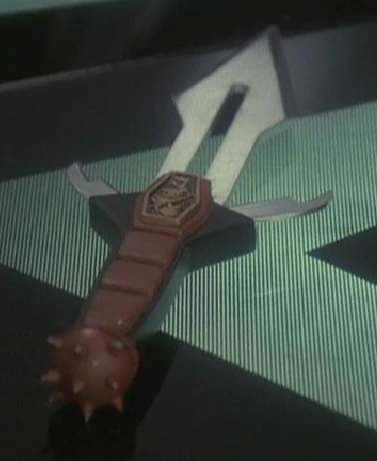

4. Big cultural emphasis on music
scotland doesn't have a tradition of opera like the klingons but we do have a grand tradition of folk music! music features heavily in scottish folklore and there is a strong traditional/folk music scene in scotland today. music is also strongly linked to warfare as bagpipes were a military instrument played in battle.
5. Stereotypes
there's a lot of negative stereotypes about scottish people that involve being drunken, hairy and violent which is... i can't even say stereotype really cause star trek just kind of portrays the klingons as Like That but anyway. something we have in common! i could go into how these stereotypes tie into classism which also ties into the racial coding of the klingons and how the idea of a 'barbarian' can be used to dehumanise both rural/working class communities and racialised groups but this is a lighthearted post so.
6. Being Massive Hypocrites
i think we all know how klingons Talk big about honour but for the most part act like absolute bastards, especially the ones in government, and my god do they have a lot of conflicting opinions on what makes 'true honour' and a 'real klingon'. well. not to say we invented that but we did put our name on it in the case of the no true scotsman fallacy! literally all the older scottish people i know are liable to double down this way when called out for talking shite. especially aberdonians which brings me to my final point
7. shit weather
almost every time we see Qo'noS in next gen it's dark and stormy, this is literally the sidebar image on its memory alpha page. looks like home!
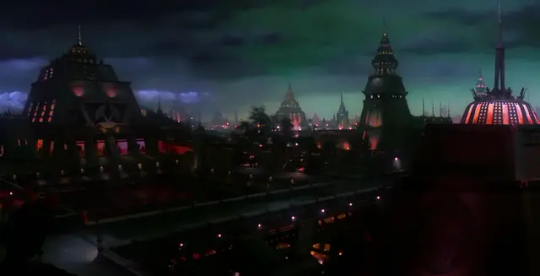
on top of that there's the mountains you often see behind first city (scotland is like entirely mountains and coast), and the story kahless tells of a guy trying to fight the wind and, predictably, dying (trying to fight the wind is a weekly scottish experience).
in conclusion: klingons are scottish to me bc i'm scottish and i love them <3
one of the many, many reasons i love the klingons so much is bc (aside from my good friend scotty) there aren't really a lot of scottish characters in sci fi and the klingons are so scottish to me
58 notes
·
View notes
Text
Riddle Is Insane Actually
Alternate Title: My Personal Beef With Riddle Rosehearts' Life Philosophy
To preface: I have an incurable disease where I want to pick fights with fictional characters, and being sad and mad that I can't. I can't even write a self insert story where I do because I can only write what I want or think Riddle might respond with but that's not a real argument I mean debate or discussion. Anyways, if you haven't already gathered, this is me trying not to rip my hair out every time I think Riddle says the craziest shit ever, so fair warning.
Also disclaimer I don't hate Riddle, I am NOT a Riddle anti he just says things that flips my fight response sometimes and it's never properly addressed in the story so here I am. This boy needs perspective and there is no one equipped to give it to him lmao.
First Point of Contention - His Philosophy Concerning Rules
I hate to have to start this off on such a granular level of "What are Rules and why do we have them?" but it's necessary if I'm going to illustrate how Riddle's worldview is broken at the core.
Rules and Laws are something we as humans have in order to live in a civilized society. The purpose behind a rule is always first and foremost, with its effectiveness in fulfilling that purpose being second. Rules are a tool.
Riddle, on the other hand, finds the value of rules to be innate. It doesn't matter to him what the rule serves, only that it is a rule. Rules are innately important by virtue of being a rule to him. He simply assumes that it must be good. And this blind faith is basically a religion.
This is an extension of his biggest flaw - his desire for total control. Both to be controlled, and to control. It's paradoxical, but people aren't always internally consistent. He can't function without some higher "authority" outside of himself dictating what he should do. In childhood, it was his Mother, and in NRC, it's the institutions he's imbedded in, the Laws of the Queen of Hearts, in particular.
He's incapable of thinking of how the motivations of those in power drives the creation of certain rules, and therefore the validity and legitimacy of them. He assumes that Authority = Goodness, period. If you were to seriously challenge this worldview with an example like Legally institutionalized Slavery, his answer based on the through line of his philosophy would have to be "Well It's the Law". Nobody in story has challenged this world view in any meaningful way still, and I doubt they ever will.
At the end of Crimson Tyrant, he did become more forgiving, but not in a way that addressed this core issue. Riddle is still floundering trying to find a way to move forward in a world where he can't simply defer to something or someone who "Knows Best".
Second Point of Contention - his Idea of Leadership Is All Wrong
As stated in the story, he had to believe this restrictiveness was to his benefit, and his tyrannical enforcement of the Laws was a way to justify the treatment he faced growing up.
It's outright stated in story that the Dorm Leader determines how closely they stick to tradition. This is the discretion given to a leader, but he doesn't see himself as a leader - he sees himself as an enforcer. He doesn't won't exercise any discretion with regards to which rules matter and which don't, because he can't. Honestly, his disposition is more suited for that of a card soldier, but his control freak complex and superiority complex won't allow for that.
Even if enforcing the Laws was something that would have lead to a better future for his Dorm, he has no concept of how to enforce it in a way that's actually effective. All infractions were treated with the same weight and therefore, the same punishment - Off With Your Head. Again, an expression of his inability to see the worth of a rule in what it serves, not just that it's a rule.
It did nothing but serve to breed resentment, not inspire respect. It showed a hysterical and immature dictator, not a competent and mature leader. He was only able to stay Dorm Leader in this situation because the rules of school dictate that pure magical prowess is what qualifies a leader, not actual leadership skills. But fear isn't a long-term answer when there would definitely be contempt and undermining of an authority that he frankly didn't deserve based on his actions thus far. If he hadn't changed, I wouldn't be surprised if the rest of the students started banding together under the table to bully and destroy Riddle in some way. Teenagers are clever and magical might can only do so much against everyone. If he were a chimp, he would have been torn limb from limb the second he had an off day.
I do think however, that his earnestness is to his benefit. He really cares about the success of his dorm members, regardless of his way of expressing this sentiment. He helps those who are struggling academically, and I believe that his "Drill Sergeant" attitude is much more useful when it's goal oriented in this manner, rather than trying to herd cats under Laws that are completely unintuitive and pointless. But again, this goes back to the first point - his inability to asses the utility of rules gets in the way of this.
Third Point of Contention - It's Perfect For His Character And That Makes Me Mad
Now I've been complaining non-stop at this point, but I must concede - this blind madness with regards to Rules is perfect for a character embodying the antagonist of Alice in Wonderland.
I think the fanbase has this view of Riddle as a short-tempered goody-two-shoes nerd. Which he is! But I think his most defining aspect as a character is his complete senselessness when it comes to Rules. Think about it. Even the most uptight assholes can generally see that certain rules are Bad. But not this guy! Like I said, his zealotry is almost religious. He seems fairly normal by the end of Crimson Tyrant, but he still very, very insane.
Anyways, that was me shouting into a void that can't answer, I hope you enjoyed it.
#disney twisted wonderland#twisted wonderland#twisted wonderland analysis#character analysis#riddle rosehearts#rant#hey don't get mad at me Riddle fans#I think he's annoyingly cute for a crazy bitch#and honestly his problems are mostly his fucked up mom's fault#I'll say it she's straight up abusive
60 notes
·
View notes
Text
i think my one complaint with the whole generational trauma zeitgeist - or making it into this all-encompassing "thing" that social relationships suffers from more than anything - is that it just feels like a narrower, more limited version of sociological storytelling.
whereas sociological storytelling has characters that respond to every sphere of influence around them - families, yes, but also wider society, culture, class, race, region, and all the other broad social learning institutions within a culture such as the education system, religion, traditions, etc etc.
generational trauma is a subcategory of sorts, maybe, and its not bad to acknowledge subcategories exist! at least its an attempt for people to understand cause-and-effect... but it is not everything. and when people don't focus as much on other aspects, you can end up thinking in this individualistic way that you can either "choose" to break the chain or not and that will be your value as a person.
that's not how it works. it prerequisites being aware of these things in order to "make" that choice (what is a choice, really? does it descent from the gods or are you at every moment responding to your environment the way you think is right?) and presupposes that one does have that free will so long as one is aware of one (1) type of social influence.
the problem often becomes whatever character that "started" this cycle of abuse or the "first round" of generational trauma. because without acknowledging these other spheres of influence, you just end up dehumanizing them and dismissing how society impacted them in turn. they just become "the source." if generational trauma is "all you got" as both cause and effect, then you have a flat character who just exists to have your problems (and your parents, who are allowed to be sympathetic only because of the trauma they themselves suffered) problems blamed on.
i think its important to acknowledge other spheres of influence over people than their immediately families... or rather, that its not just their families or the specific way history repeats itself in their immediate social circle that matters.
the good news is that a lot of generational trauma stories understand this. there is a cause-and-effect to the parent or grandparent that supposedly "started" the cycle and that they were the product of their own environment and social circumstances... but in social media, not so much. if you yourself can't point to a higher "bad guy" further up than you in the chain, sorry, no sympathy for you.
30 notes
·
View notes
Text
Worldbuilding in Cinder, Part 1
I figured I’d give some insights to my worldbuilding choices in my fanfic Cinder for the readers who’ve been following me here on tumblr. Unlike some of my past works, I’ve been trying hard to make the text itself stand on its own without the need for marginalia and notes to hold the reader’s hand. But nonetheless, this is always a fun subject for me to talk about.
Neither this blog nor the fic itself is meant as any sort of criticism of the worldbuilding in the canon show. For the most part, the setting changes I’ve made I’ve tried to either be just lore expansions from the original, or changes to fit the more mature tone of the fic. Because it’s ultimately in service to telling a compelling story.
The Fire Nation
This is probably where I’ve bucked the usual trends the most. Most fanon accentuates the parallels to between the Fire Nation and Japan, particularly the post-Meiji restoration Imperial Japan. There’s nothing wrong with this in itself, but I think there’s a danger in constructing a fantasy culture too closely to any one real world culture. Such depictions can easily fall into caricature, or pull the fantastic setting too close to real world and rob some of the magic of fantasy.
Instead, mostly for my own amusement I drew on the aesthetic connection to South Asian cultures from the show, drawing on India and Hinduism’s immense influence. I chose this because India has been an interest of mine since I was a teenager, so I already had a good knowledge base, and this gave me an impetus to read and learn more.
There’s a lot of disparate artistic influences portrayed in the art, clothing, architecture, food and culture of the Fire Nation. I think it’s fair to say, especially since the comics and the Kyoshi novels, they’ve probably had the most canonical interest, with a lot of cooks in that kitchen. Zuko is the fan-favorite, and as the primary antagonists of the original, so this was natural. In fleshing out the fictional history of the Fire Nation, a parallel to the Indo-Aryan migrations seemed a natural way to tie together that diversity.
As a quick aside, I must vent about my frustration with the 20th century’s most malicious case of cultural appropriation with regard to that word ‘Aryan’--the abuse of ancient Indian culture and symbols by 20th century Nazis has unfortunately made this a perilous exercise, and I have no choice but to write around it. The word ‘swastika’ itself comes from Sanskrit, meaning “conducive to well-being”, part of the very common iconography of sun wheels. ‘Aryan’ was an endonym shared among many peoples across ancient Iran and northern India, and connoted adherence to a shared set of values and way of life, having linguistic roots in words for nobility.
Unfortunately I can’t undo this plundering, nor can I just pretend it never happened, but limitations breed creativity. There’s an upcoming scene where after a hunt with some other young warriors of the Northern Water Tribe, Azula is asked to share a tale of her people, and wanting to use this to exposit on how the Fire Nation came to be a fusion of an Indian and a Japanese inspired culture, I ended up finding some interesting ways to adapt a thread from the Rigveda and Mahābhārata for her tale. And if you can guess what that is, you get a cookie.
This world-building has come to the fore most directly with religion. Hinduism’s deep influence on East Asian religion and culture is often overlooked, but through the expansion of Buddhism into the Sino-sphere, a large number of Hindu gods, cultural practices and values left their mark. Buddhist deities almost invariably correspond directly with a Hindu equivalent, and Buddhism’s influence was perhaps strongest in Japan, where syncretism between Buddhism and native Shinto is so thorough it is often impossible to separate the two traditions.
There’s an added bonus that a Sanskrit substrate also helps explain all the words and names in the Fire Nation that really don’t fit, most fittingly Azula and Azulon’s names. This, I must stress, is just my idle amusement, drawing an etymology through Sanskrit’s sister tongue of Old Persian, the ultimate source of words like ‘azure’/’azul’ in Europe, back into whatever language they speak in the present world of the Avatar.
Language
Another idle amusement I’ve found is how language works in the world of Avatar. And I think there being a dominant lingua franca that has displaced older languages makes a great deal of sense. Because there’s a pretty compelling figure that at least in theory ties all the nations together: the Avatar themself.
Chinese logograms are omnipresent in the show, from the title cards to diegetic text. This makes a great deal of sense. Hanzi in their purest form are pronunciation independent. They convey an idea directly, and so long as sender and receiver know what the symbol is supposed to mean, they can communicate.
This is important because the idea of a Chinese language is sort of a fiction even at present. Local dialects of Mandarin Chinese even now have the kind of variation you’d expect of a culture with 5,000 years of history, in spite of the long record of central governments trying to promote cultural homogeneity in China. These dialects of Mandarin (without even getting into the other Sinitic languages like Cantonese) have major pronunciation and grammatical differences, to the point where they can be as distinct from each other as the Romance languages are from each other or Latin.
Why is one a dialect and another a language? As Yiddish linguist Max Heinrich famously quipped, “a language is a dialect with an army and a navy.”
The dominant Chinese language, Mandarin, gets its name not from any particular ethnic group or region in China, but from a class of functionaries who spoke and wrote it, the guān of Imperial China, who came to be known as mandarins in Europe through a game of linguistic telephone through the Malay language ultimately to to the Sanskrit mantri, meaning counselor or minister, and also sharing the same root as the word mantra. It’s that bureaucracy that kept China functioning as a single state, even as dynasties came and went, the country was conquered by foreign nomads multiple times.
To me, the most obvious reason why at the ‘present’ that the world speaks one language, whatever the local variations, is because its a project done by the Avatar over generations to promote balance in the world. Other languages exist and are even still spoken; the ancestral languages of the Northern and Southern Water Tribes hold deep cultural significance, to the point where in the North in particular it is still used in daily life. In the Fire Nation, the old tongue, a Sanskrit like language, is still a language of the privileged, used for literature, poetry, and religion, even as daily life has more or less switched over to the “common tongue”, though the former has come to be written with hanzi instead, with the once elegant writing system now living on as the furigana-like pronunciation guides and vulgate used by those without full, classical education.
I figure this common language has its origins in the Ba Sing Se upper ring dialect, likely beginning some untold generations ago with an Earth Kingdom Avatar, promoted by their successors--and Earth Kingdom imperialism--to the point that it is a fact of life in present day. Accordingly, it has displaced local languages most thoroughly in the Earth Kingdom itself, the most ethnically diverse of all the four nations by virtue of size and geographic diversity.
Other fics I’ve read have tacked the opposite direction, giving each culture their own language and finding other ways to explain how our heroes communicate, usually by making them polyglots. It’s certainly a valid approach, but it’s also more work than I’m willing to do when there’s an easier option just staring me in the face.
Having Fun
Like I said before, this stuff has mostly been about me having fun and giving texture to the story I’m writing. It’s not a bible on doing worldbuilding in the Avatar setting, but if you see ideas you like from here or in my fic, by all means don’t be ashamed to borrow. I am doing this as a hobby and see no reason to be defensive about it.
There have been plenty of other blogs on here about how fan culture does tend to approach various cultures in an Orientalizing or Othering fashion, especially the Water Tribe. When I do another one whenever and talk more about some of the worldbuilding I did for the Water Tribe, I’ll touch on that then, with links to the originals which I highly recommend reading. Until then, have a good one.
16 notes
·
View notes